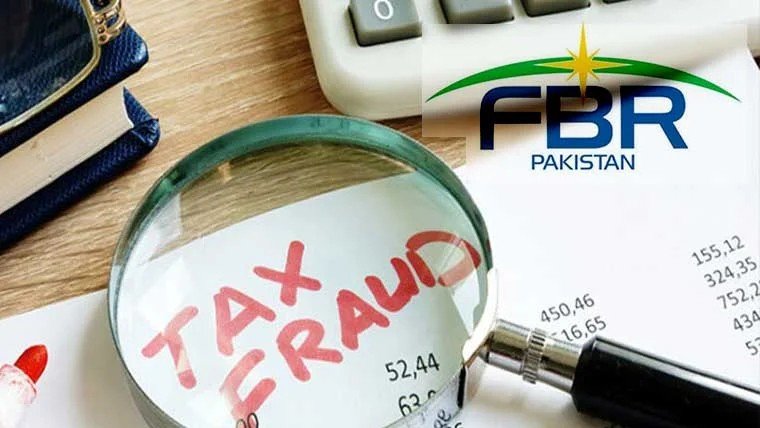
In a decisive move against financial crime, Pakistan’s Federal Board of Revenue (FBR) has announced the arrest of five individuals allegedly involved in a massive tax fraud scheme worth over Rs. 50 million. This operation marks a significant escalation in the government’s ongoing efforts to curb tax evasion and plug revenue leaks, particularly through the misuse of fake invoices and fictitious business entities.
The Arrests and Their Context
The arrests were carried out by the Intelligence & Investigation-Inland Revenue (I&I-IR) wing of the FBR, specifically by the Hyderabad regional office. Among the five arrested are a Chief Financial Officer (CFO) and a Purchase Officer affiliated with a battery manufacturing company based in Lahore. These individuals are accused of masterminding a tax fraud scheme involving the creation and use of fake invoices to claim illegitimate input tax credits on sales tax.
According to FBR officials, the operation was conducted after an extensive investigation that uncovered a well-organized network of businesses involved in issuing and receiving “flying invoices”—a term used for fake sales or purchase documents that have no actual underlying commercial transactions. This practice is commonly used to inflate input tax claims and reduce the overall tax liability.
Modus Operandi: How the Fraud Was Committed
The alleged fraudsters created fictitious supply chains and issued fake invoices to businesses that did not exist or were mere paper companies. By doing so, they managed to claim massive tax refunds without actually delivering any goods or services. The fraudulent tax refunds were then either pocketed or used to artificially reduce the tax burden of affiliated entities.
Such schemes not only result in significant financial losses to the national exchequer but also distort the competitive landscape for genuine businesses that operate within the bounds of law.
The FBR estimates that the fraud in this particular case caused losses exceeding Rs. 50 million, and possibly more when related entities are fully audited. Investigations are ongoing, and more arrests may follow as evidence unfolds.
National-Level Action and Broader Implications
The crackdown is part of a broader initiative launched in late 2024 under the supervision of the Finance Ministry and top FBR officials. In a press conference held in October 2024, the finance minister and FBR Chairman announced a nationwide campaign against tax fraud and fake invoicing. This operation is among the first major actions taken under that initiative.
The arrests signal a clear message from the government to financial officers, accountants, and procurement managers across the corporate sector: involvement in fraudulent tax activities will not be tolerated, and the consequences will be severe.
Authorities also indicated that CFOs and other key decision-makers who knowingly participate in such schemes will be held personally accountable, irrespective of their position or corporate stature.
Impact on Businesses and Public Trust
The move has been largely welcomed by tax experts, economists, and the business community, particularly those who have long advocated for stricter enforcement against white-collar financial crime. By cracking down on tax fraud, the government not only seeks to recover lost revenue but also restore public confidence in the tax system.
However, experts have also warned that while enforcement is critical, it must be coupled with structural reforms that simplify tax compliance, encourage transparency, and reduce the opportunity for manipulation. A more streamlined tax filing system, stronger auditing tools, and automated invoicing mechanisms can significantly limit the scope for such fraudulent activities.
FBR’s Use of Technology and Intelligence
In recent years, the FBR has ramped up its use of technology to detect tax fraud. Using data analytics, AI-powered monitoring systems, and cross-referencing tax returns with transaction-level data, the agency has improved its ability to identify suspicious patterns. This particular case is believed to have been flagged through advanced data matching and anomaly detection techniques.
Additionally, the establishment of specialized units within I&I-IR has enabled quicker investigations and faster legal action. The arrests in this case were conducted swiftly after solid evidence was gathered, and arrest warrants were secured through legal channels.
Looking Ahead
With this case making headlines, more such crackdowns are expected in the coming months. The FBR has made it clear that it will not stop at small or mid-sized businesses; even large corporations will be scrutinized if irregularities are suspected.
As the investigations progress, it remains to be seen how deeply rooted this particular fraud network is, and whether other accomplices or facilitators within regulatory bodies or the private sector will be exposed.
Conclusion
The arrest of five individuals involved in a Rs. 50 million tax fraud is a pivotal moment in Pakistan’s financial enforcement landscape. It reflects a shift toward stricter accountability and a broader campaign to rebuild trust in the nation’s tax infrastructure. If followed through with consistency, transparency, and systemic reforms, such measures could significantly improve revenue collection and promote a more equitable business environment.
Reference: پانچ کروڑ روپے ٹیکس فراڈ کے ملزمان کی گرفتاری کا فیصلہ


